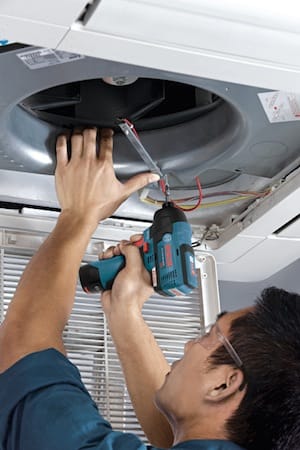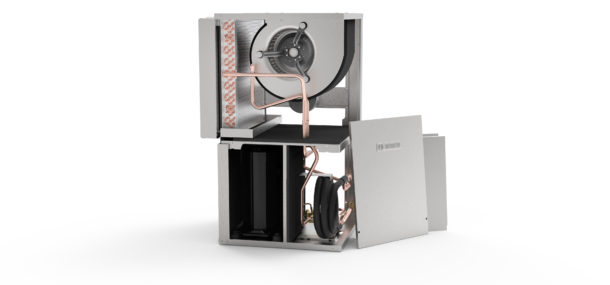As professionals within the space, it’s our responsibility to inform and educate residential property owners in choosing an energy-efficient HVAC for their homes. By providing additional knowledge and assistance, professional mechanics can also separate themselves within the space.
Whether you are an aspiring mechanic or an experienced professional in the field, quality customer service and educating consumers can provide a variety of benefits. To help homeowners understand which HVAC is best for their homes, share insight into which energy-efficient system would be a good fit. Not only are you educating these customers, but by developing positive relationships, you can earn strong word-of-mouth connections.
Use this information to assist homeowners when trying to find the most energy efficient HVAC systems for their home.

What is an Energy-Efficient HVAC System?
Naturally, HVAC systems come in a variety of different sizes, types, commercial and residential alike. As technology advances, new systems start to separate themselves from their traditional counterparts. In the mechanic community, we are constantly battling how to navigate these changes while still helping consumers save energy and money in their residential properties.
According to energy.gov, heating and cooling accounts for about half of a typical home’s energy usage. Thus, high performance HVAC systems are essential in managing energy consumption and associated costs for individual homeowners. Although some might not seem as powerful, they can ensure a sufficient job with energy usage in mind. When explaining HVACs to consumers, be sure to clearly define and differentiate what an energy efficient HVAC is and how these systems would work in their homes.
How to Differentiate Between Energy Efficiency Measurements?
Based on their functionality, there are distinct measurements of efficiency performance based on different HVAC systems. Primarily, reviewing the efficiency measurements are what makes the difference between these units. Their purpose varies and so do their energy consumption measurements. One of the most common of these statistics include, AFUE (Annual Fuel Utilization Efficiency), HSPF (total heat output), and SEER (Seasonal Energy Efficiency Ratio).
When investing in the right system, it’s critical to identify these high efficiency measurements. For example, when buying a new appliance or system, checking for energy data along with what makes a product ENERGY STAR certified will help define the energy saving capabilities of that machine. The ENERGY STAR certification plays a major role in determining the power saving opportunities of a given system. Carefully choose the devices with the highest percentage of either AFUE, HSPF, and SEER.
How to Help Them Decide Which System is Best for their Property?
In order to help a homeowner decide which systems are best for their property, they need to understand their options. They also should consider their home’s age, layout, geo-location, weather, and temperature patterns. These elements will directly impact which machines will be the best fit to make their home as comfortable as possible.
The most common and effective devices for heating a residential property are furnaces with high percentages of AFUE and energy efficient heat pumps. For summertime, the most ideal cooling system combination would be either using a heat pump or air conditioners. Take into consideration the amount of heat a home is exposed to along with the amount of cold a property can experience on a yearly basis.
 Ideal Types of Efficient HVAC Systems
Ideal Types of Efficient HVAC Systems
Furnace
For a furnace in particular, the efficiency measurements are in terms of AFUE (Annual Fuel Utilization Efficiency). We will want to install a furnace for homeowners with high measurements of AFUE. For example, if they purchase a furnace with an AFUE of 90% meaning that 90% of the energy you are investing in is being used to heat your property. This has become the most preferred method of heating a residential property, these devices can run on gas, oil, electricity, and they can vary in energy efficiency.
Geothermal Heat Pump & Air-Source Heat Pump
Other efficient systems to install include a geothermal heat pump and an air-source heat pump. Both provide an improved energy saving method of heating and cooling necessary for a home. In heating mode, the energy will be measured by HSPF, which means the (total heat output). Because it both warms and cools, in cooling mode, you will want to be mindful of the SEER (Seasonal Energy Efficiency Ratio) rating — the higher the better but ideally over at least 20.
A geothermal heat pump is a stable but expensive way to heat and cool your property, the system itself uses the earth as a source of heat. On the other hand, an air-source heat pump ventilates air in and out of your home. When in heating mode, this specific system uses refrigerant cool air and moves heat in from the outside, which is not exactly ideal for colder climates.

Air Conditioners
In comparison to the other home comfort systems, as you know, an air conditioner plays a significant role in cooling a home in hot temperatures. In warmer climates, this is an essential unit to install when reviewing a residential property’s interior comfortability. Typically, air conditioners are matched with a corresponding furnace to heat a home in the colder months. These appliances use SEER to measure energy competency, so as you search, consider investing in a higher SEER rating.
How to Ensure HVAC System Longevity?
After homeowners decide which machines are best for their property, remind them the importance of your services, the installation process, and preventative protection along with any maintenance tips. When installing these systems, be transparent with the residents; your knowledge will help them get a better understanding of how to treat these devices. Doing so will also establish a sense of security and trust with your consumers.
Some maintenance tips that you should share with your customer include, how to clean system filters, clean around the machine itself, prevent obstruction, and inspect their air ducts. The health hazards of dirty furnace filters is something that every homeowner should be able to avoid if they are instructed on how to do so. Seasonally, every homeowner should also revisit their HVAC appliances to check for cleanliness, effectiveness, and/or proof of proper installation.
In order to ensure longevity and effectiveness, remind them of their protection options as well. One option could be getting warranties on each appliance individually, which could get expensive, or investing in a single home warranty policy. Both options can provide an umbrella of protection against natural wear and tear for every system, while making it easier to access job opportunities. Sharing additional options with your consumers not only educates them, but shows that you are committed to protecting their investment as well.
Final Thoughts to Consider
Each year in the U.S., three million heating and cooling systems are replaced and large amounts of money are used for repairs. We can continue to try to find new ways to make saving energy easier than ever before.
Visit your partners at Mechanical Hub for products, news, industry insight, and featured articles to learn more about what is happening in the industry right now.




Join the conversation: